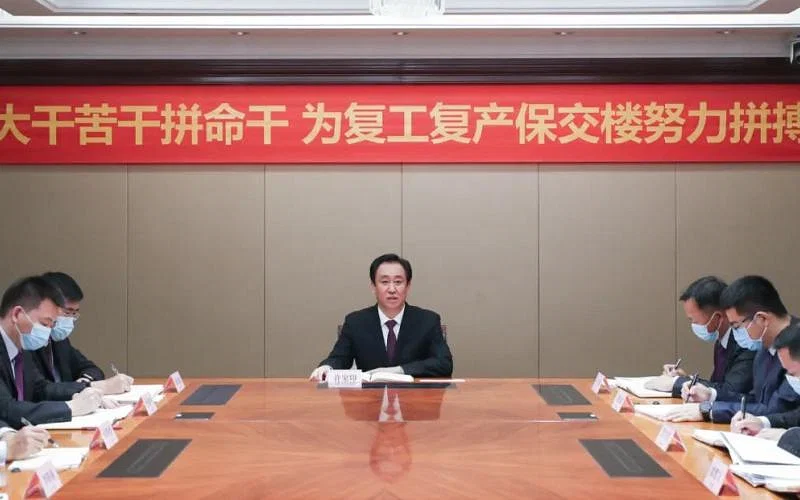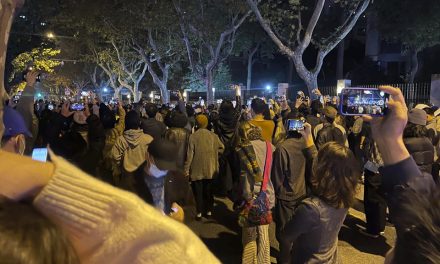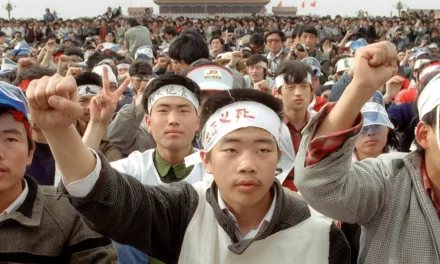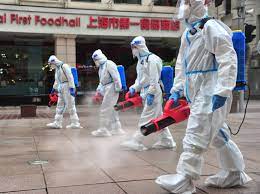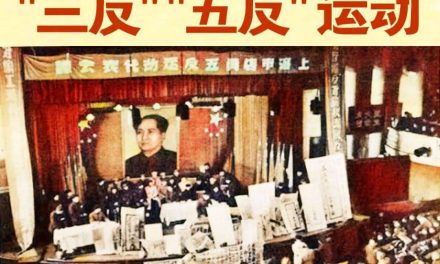By Wen Jian
Looking back after some years of its existence, historians have been reviewing the path of China’s “Red Dynasty.” According to Professor Xu Chenggang’s diagnosis, this Red Dynasty ultimately died due to the genetic defects inherited from the regime incubated in the Soviet-Russian model. This system was fundamentally incompatible with freedom. Therefore, any short-term economic freedom and partial opening up was destroyed by growing security fears. Quantitative historical research pioneered by Professor Chen Zhiwu found that the Red Dynasty’s great collapse actually began with the “three red lines” set up to suppress the private real-estate industry. And the iconic event was the fall of the Evergrande company, which became the first domino that ultimately led to the overall dynasty’s financial collapse. And the overthrow of unelected regimes must begin with such financial collapse.
China’s “private” real-estate companies, whose land is monopolized by the government, are actually tax collectors for it. The purpose of such tax farming [privatizing the task of tax collection] is to reduce the government’s tax-collection costs and thus improve the task’s efficiency. However, after the government’s own state-owned real estate enterprises developed and expanded, the government began to strengthen its control over the real-estate industry via the “four restrictions” (purchase restrictions, loan restrictions, price restrictions, and sales restrictions). However, local finance was still highly dependent on the contributions by the tax collectors, and even under the four restrictions they were still very active and continuing to race to expand their territory. So the Red Emperor was furious, and issued another “three red lines” [promulgated under the central government’s “houses are for living, not for speculating” policy] order on August 20, 2020 (requiring the asset-liability ratio after excluding advance receipts to be greater than 70 %; the debt-to-equity ratio had to exceed 100%; the cash-to-short-term-debt ratio had to be less than double), strangling the operation of real estate companies.
Evergrande, the leading private real-estate company, was the first to suffocate and collapse. All private real-estate companies such as Country Garden, Sunac, and Aoyuan are now dying. Only state-owned real estate companies can rely on the oxygen supply of state-owned monopoly banks to barely survive. However, due to the suppression of the real-estate industry, which destroyed public confidence in real estate and artificially punctured China’s real-estate bubble, the price of real estate, which is the main vehicle for wealth storage for many Chinese, has fallen. Coupled with the “dynamic clearance” policy of violent COVID prevention, the confidence to engage in private investment and consumption has also plummeted. The decline, combined with the accelerated departure of international industries brought about by Russia’s war of aggression against Ukraine, has sharply highlighted the shortcomings of China’s economy, which is mainly driven by government investment, and has thus quickly fallen into recession.
The Chinese government’s tactics for suppressing private real-estate companies are not new. Do you know how the “socialist transformation of industry and commerce” started in 1953? Starting from centralizing the purchase and sales of raw materials, the CCP soon controlled the supply of raw materials and final sales of private enterprises at the source, rationing supplies and limiting sales prices. Private capitalists could then not afford to stay in business. While some became so-called “paratroopers” and jumped out of buildings, the remainder could only cry and beg the government to take over their enterprises. Although this was called “redemption” of company assets, who was in a position to bargain?
Land and capital are the raw materials of the real-estate industry, and the “four restrictions” have blocked final sales. The above approach is highly similar to the socialist transformation of industry and commerce in the 1950s. (At least Xu Jiayin [recently arrested chair of the Evergrande group] did not jump off a building, which made him luckier than many bosses in the 1950s. )
The new round of socialist transformation of China’s real-estate industry has had immediate social effects.
In 2020, China’s land-transfer fee revenue [income earned from selling land-use rights, although not the land itself] was 8,414.2 billion yuan, and in 2021, driven by inertia it reached a peak of 8,705.1 billion yuan. Including other tax revenues from the real-estate industry (deed tax 742.8 billion yuan, land value-added tax 689.6 billion yuan, real-estate tax 327.8 billion yuan, cultivated land-occupation tax 106.5 billion yuan, urban land-use tax 212.6 billion yuan), the direct tax revenue generated by China’s real-estate industry in 2021, totaling 10,784.4 billion yuan, as well as many miscellaneous fees, were mainly used by local governments. In 2021, China’s total tax revenue was 17,273.1 billion yuan, and land-transfer fees alone were close to half this figure.
By 2022, China’s nominal land-transfer revenue was 6,685.4 billion yuan, but about 90% of it derived from local governments asking their affiliated subsidiary urban [government] investment companies to “buy” land and cash out the associated bank mortgages to fund fiscal expenditures. The total amount of China’s local-government debt now actually exceeds one hundred billion yuan, and the collateral is mainly government-owned land. Private real-estate companies no longer dare to buy land, and the government’s scheme of relying on these urban-investment companies to buy land is unsustainable. Land cannot be sold for cash. China’s banking industry is also facing total bankruptcy. The shell game of passing on local government debt can no longer be played.
The tax-sharing system that began in 1994 has led to the centralization of financial power and the decentralization of administrative power. Local finances have become increasingly dependent on the real-estate industry. By way of analogy, a deeply addicted drug addict will inevitably fall into madness if the supply is suddenly cut off. In order to “make money,” officials will similarly use any deceitful means. After this fails, salary cuts, layoffs, and collective visits will inevitably spread across the country, and many who job was formerly to maintain stability will themselves become targets of the stability maintainers.
But the opportunity to rescue China’s real-estate sector has been repeatedly delayed. After Evergrande’s debt explosion in September 2021, its assets were 2.3 trillion [yuan], liabilities were 195 million, and net assets were still 350 billion. Most of the assets were coastal land and renovation projects in old Shenzhen city. As long as a little liquidity had been injected, the intervention of one or several large state-owned enterprises and asset-management companies could have stabilized the situation. And administrative restrictions that undermine the normal operation of the market, such as the aforementioned “three red lines and four limits,” should have been quickly relaxed, so that the crisis would not spread to the entire real-estate industry and related upstream and downstream industries, or at least the intensity of its shocks could have been greatly reduced.
However, the Chinese government at no level has taken any effective measures. The government only emphasized “guaranteeing the delivery of buildings,” as local governments were competing to control the sales funds of local real-estate projects, further exacerbating the depletion of funds for real-estate companies. At the same time, the government triggered widespread panic in society, the credibility of private real-estate companies was completely destroyed, and the real-estate market shrank sharply. Used houses can now no longer be sold.
The stringent “dynamic clearing” domestic COVID-prevention measures in 2022, as well as Russia’s invasion of Ukraine starting on February 24, 2022, and the “unlimited cooperation” between China and Russia have further worsened China’s domestic and foreign political and market environments. During this period, the Chinese government still insisted on “housing is for living, not for speculation.” Although it introduced indifferent measures such as the “Financial 16” [measures to stabilize real estate in late 2022], it had not loosened its grip on the neck of private enterprises. It’s obvious economic suicide, but still they continued doing it.
Finally, in July 2023, the CCP Politburo held a meeting to discuss economic issues, and clearly stated that there have been major changes in both supply and demand in China’s real-estate market, and no longer mentioned the “housing is for living, not for speculation” slogan. But it was too late.
During this period, CCP officials kept repeating one slogan when responding to external inquiries about how to deal with the exploding real- estate crisis: marketization and the rule of law. But for Evergrande, if it cannot repay its debts without going bankrupt or selling properties at reduced prices, no market-based self-rescue methods will work. The clichés of marketization and the rule of law have become a joke.
The Evergrande matter is a landmark event for foreign investors to observe China’s politics and economy. The Chinese government has made the worst choice at every step. Originally, according to its “institutional advantage” in “concentrating efforts on major things,” the Chinese government still had sufficient planning means to solve the problem. But officials at all levels are completely inactive. There is no market, no plan, and not even surface measures to calm the people.
Some in the Red Dynasty should surely know the consequences. At least Liu He, who was in charge of economic work at the time, knew a little bit about the laws of the market. But there is no one to take responsibility at all. What is said and done is as empty as what was said in the Dream of the Red Chamber — people whistling past the graveyard, looking the other way and pretending things are fine as they actually fall apart. Why? Because since the internal purge in the name of anti-corruption began in 2013, a constitutional amendment in 2018 marked the complete reduction of CCP policy from collective property rights for the party as a whole to private property rights [fought over among factions of the CCP]. But since the Soviet Union founded the CCP with a sort of venture capital, unclear property rights have been a chronic problem under the latter’s rule, which has been accompanied by endless internal fighting. Struggling means struggling over property rights. However, even Mao was not able to fully control the CCP’s ownership structure. And the old ministers are still somewhat afraid. But one person was ignorant and fearless, and blatantly transferred the party’s collective property rights to himself, turning other small shareholders into mere wage earners. So they all laid down and watched the complete collapse of China’s real-estate industry. Real estate is the main tool for Chinese people to store wealth, and national assets have shrunk significantly.
Xu Jiayin’s imprisonment is actually just the beginning of Evergrande’s asset disposal. The Chinese government has realized that it can no longer deal with it using the cliché of “marketization and rule of law” and must formally start the distribution of the company’s assets. Putting Xu in jail is not only just finding a scapegoat, but also makes him take the blame for the government’s chaotic control methods that destroyed the real-estate industry. Some fools always like to see the rich and famous being unlucky, as if they can feel safe and happy even if they are in the gutter themselves. Local princes can also use this belief to avoid suspicion of collusion with private companies, and can use other means to dispose of Evergrande’s assets. Under imperial power, officials must not only bear responsibility for the consequences of their actions, but also avoid suspicion. So Xu Jiayin had to go to jail.
What is the next step for Evergrande? At this point, it is completely impossible to stabilize housing prices, land prices, and expectations in individual cases. There is a high probability that the Chinese government will print money without any anchor, and state-owned real estate companies or AMC companies will “redeem” most of the housing and land owned by Evergrande. If you buy now, the effect of saving the market will be better than waiting for Country Garden and Sunac to also collapse. Of course, buying and selling must actually be controlled by the Chinese government, as only it will be able to decide prices, when to pay them, and how much to pay creditors.
Printing money is the most labor-saving means of taxation. Governments around the world exert themselves to print more money. The Chinese government, which has unlimited public power, has been vigorously creating money, but at least this process has been restrained. (Since the Chinese government decided to use debt itself as the anchor, it is actually possible to issue unlimited money, but the previous Chinese prime minister, Mr. Li, still had a certain bottom line in this regard). There will definitely be no anchor to prevent excess money printing in the future, and in a few years there is a high probability that the RMB will become equal (in absolute value relative to the US dollar) to the Japanese yen, and its value will fall even further to that if the Korean won. Of course, the official exchange rate may still be “strong,” but ordinary people can’t exchange RMB for foreign currency at that rate. Real estate in big cities and gold bars have already become the only assets in the country that can maintain their value.
Evergrande is just the first private enterprise to accept this socialist transformation. The market economy that was written into the constitution (although still with the socialist modifier) ended with China’s Red Dynasty. Next will be a new round of socialist transformation of industry and commerce. Although it may take into account the reality of the current serious economic downturn and accept the lessons brought by the excessively violent methods and “moving too fast” in the 1950s, so that the process and means may be slightly more moderate, the ending will be the same. As long as any of these figures is in charge, the direction will not change.
Now, reaching the end of the Red Dynasty, it is a “garbage era” in Chinese history. It is oppressive, dumb, wretched, mixed throughout with blood and tragedy. If you have a chance to escape, hurry. The last time the gate was closed was at the end of 1952, and it lasted for thirty years.
September 28, 2023
Exclusively published by Yibao, with pictures from Singapore’s Lianhe Zaobao.
This piece was translated from Yibao Chinese. If republished, please be sure to add the source and link https://www.yibao.net/?p=247623&preview=true before the text when reposting.
The views of the author do not necessarily represent those of this journal.

